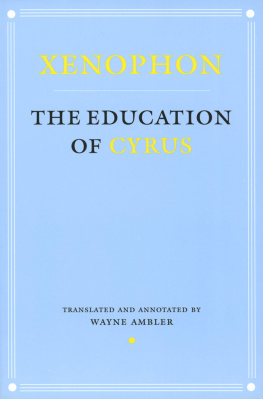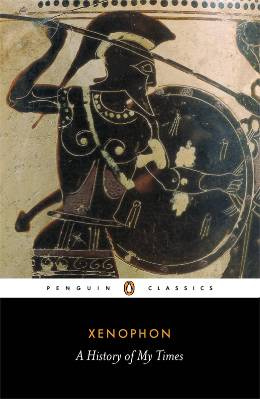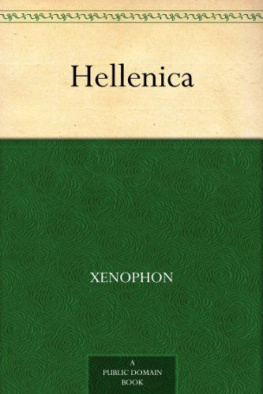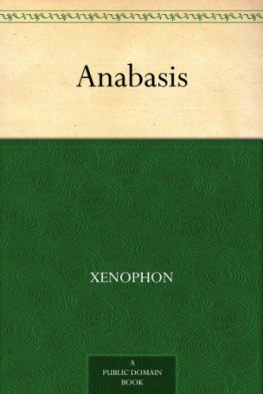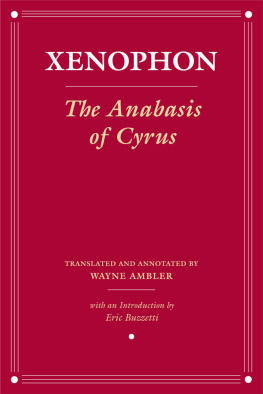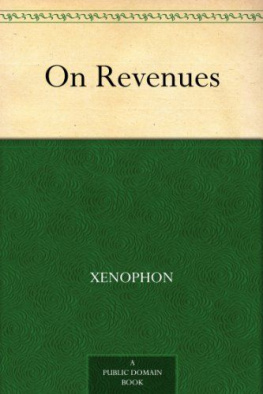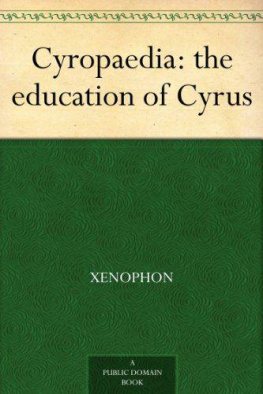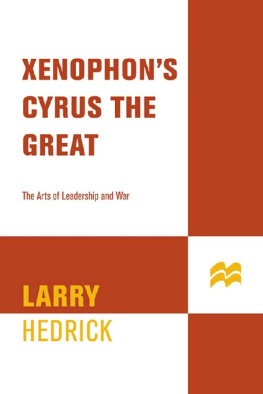Xenophon - The Education of Cyrus
Here you can read online Xenophon - The Education of Cyrus full text of the book (entire story) in english for free. Download pdf and epub, get meaning, cover and reviews about this ebook. year: 2014, publisher: CornellUP, genre: Art. Description of the work, (preface) as well as reviews are available. Best literature library LitArk.com created for fans of good reading and offers a wide selection of genres:
Romance novel
Science fiction
Adventure
Detective
Science
History
Home and family
Prose
Art
Politics
Computer
Non-fiction
Religion
Business
Children
Humor
Choose a favorite category and find really read worthwhile books. Enjoy immersion in the world of imagination, feel the emotions of the characters or learn something new for yourself, make an fascinating discovery.
The Education of Cyrus: summary, description and annotation
We offer to read an annotation, description, summary or preface (depends on what the author of the book "The Education of Cyrus" wrote himself). If you haven't found the necessary information about the book — write in the comments, we will try to find it.
The Education of Cyrus — read online for free the complete book (whole text) full work
Below is the text of the book, divided by pages. System saving the place of the last page read, allows you to conveniently read the book "The Education of Cyrus" online for free, without having to search again every time where you left off. Put a bookmark, and you can go to the page where you finished reading at any time.
Font size:
Interval:
Bookmark:

To the memory of my father
That Xenophon is a thinker of the first rank is definitely not the dominant view in the academy today. Nevertheless, a growing literature takes note of his more distinguished earlier reputation and argues that Xenophons often unassuming and apparently naive prose is in fact a carefully chosen vehicle for reflections with profound political and ethical implications. Open-minded readers of The Education of Cyrus will naturally want to put this view to the test, and this translation is intended to help them do so.
I have been guided by the view that Xenophons treatment of philosophical issues is worthy of the most serious study. As he often touches on such issues obliquely and through the associations of his terminology, I have taken pains to convey as accurately as possible everything that might help readers to encounter his thought, even though doing so complicates the task of translating into familiar English idiom. I do not claim to have achieved full accuracy nor do I deny that the literary qualities of the Education would themselves be worthy of careful study. Instead, I state my aim in order to explain
Translating a text that might convey important knowledge or even wisdom increases the translators responsibility to translate accurately. In the name of fidelity to Xenophons Greek text, I have tried to translate as consistently as possible the words that are most directly related to the major issues of the work. An example of one such issue is whether what is kalon is also agathon, whether what is noble is also good. When and in what ways is it also good for someone to perform noble actions? Is it good in substantial ways, or only for the sake of appearances? Do the gods directly or indirectly protect or reward those who act nobly? Are there other foundations for an ethics of noble self-sacrifice? If there are actions that may be good without being noble, what sort are most worthy of serious attention? Only partly because the Education is more like a novel than a treatise, Xenophon raises but does not answer questions of this sort directly, and yet many episodes in the work shed light upon them (e.g., 1.5.710, 2.2.2324, 6.3.36, 6+6, 7.1.42, 7.3.11, 8.1.30). A consistent translation of kalon allows readers to see and follow the moral, political, and theological questions raised by noble self-sacrifice, thus enabling them to grapple with them with a reduced measure of distortion by the translator. For such reasons I have sought consistency wherever possible, especially for words like kalon that are so important for the central themes of the work.
A glossary and notes will help interested readers to see a bit more of the Greek that lies behind the English translation, and they indicate as well certain of the more important cases in which I have not found it possible to translate with strict consistency. In the important case of kalon, for example, the Greek word has a wider range of meanings than does the English noble, so strict consistency would lead us to use the English noble, where the Greek kalon may mean merely fine or okay, without any important difference from good (e.g., 4.1.1). Since kalon can also mean beautiful or handsome (e.g., 1.3.2, 5.1.8), such consistency would also mean speaking of good-looking people as noble. In short, the consistent translation of a single word can be misleading, just as inconsistency can keep readers from seeing the richness of an authors use of a particular word.
Although I have stopped well short of the strictest possible consistency, I have striven for it wherever it did not run counter to the sense of the Greek. If the result sometimes sounds a bit odd, it is often the result of an attempt to give the reader a better chance to understand the text. It is also true that Xenophon himself seemed not to have minded sounding a bit odd in certain places, as when he speaks of a just chariot needing to have just horses to pull it (2.2.26). What is more, it would be more than surprising if a book written over two thousand years ago contained nothing that at first glance seemed strange to us. I have in any event not taken it to be my goal to make the book conform to a preconceived notion of the authors intention nor to place the readers ease above all.
I have translated the Greek text published by the Socite ddition Les Belles Lettres, and I have noted my few departures from it.
I have kept the notes to a minimum. Readers new to the Education should bear in mind that many of the events and issues in this book recall passages from other works of Xenophon and acquire added importance when considered together with them. Bruell and Nadon are of special help in guiding study of the Education in the context of Xenophons writings as a whole.
The deficiencies in what follows are evidence of my own, but I am fortunate in being the beneficiary of much helpful advice. I am especially indebted to Robert Bartlett, Amy Bonnette Nendza, Scott Crider, Alexander Alderman, and Chris Lynch for their suggestions about the translation, and to Peter Heyne, Connie Baumgartner, and Catherine Ambler for proofreading and help with the glossary. The National Endowment for the Humanities helped support this project with a summer grant. For my appreciation of Xenophon I am indebted to Chris Bruell.
. The best introduction to the recent secondary literature on the Education is Christopher Nadon, From Republic to Empire: Political Revolution and the Common Good in Xenophons Education of Cyrus, American Political Science Review 90 (June 1996): 36174. For an extended consideration and brilliant analysis of the Education as a whole, see Christopher Nadon, Xenophons Prince: Republic and Empire in theCyropaedia (Berkeley: University of California Press, 2201). For a guide to the literature that takes Xenophon seriously as a philosophic thinker, see Amy L. Bonnette, Translators Note, in Xenophon, Memorabilia, trans. Amy L. Bonnette (Ithaca: Cornell University Press, 1994), xxviixxviii.
. Xenophon, Cyropaedia, trans. Walter Miller (Cambridge: Harvard University Press, 1914); Xenophon, The Education of Cyrus, trans. H. G. Dakyns (London: Everymans Library, 1914; reissued 1992).
. Xnophon, Cyropdie, vols. III ed. Marcel Bizos, vol. III, ed. Edouard Delebecque (Paris: Belles Lettres, 197178).
. Christopher Bruell, Xenophon, in The History of Political Philosophy, ed. Leo Strauss and Joseph Cropsey (Chicago: University of Chicago Press, 1987), 90107; Nadon, From Republic to Empire, 36174.
Xenophons Education of Cyrus offers its own introduction, one that helps turn the readers attention to the core issues of the book. It states a problem and proposes a solution, or at least a way of arriving at a solution. The problem is that because it is very difficult for human beings to rule over other human beings, political instability is a constant fact of life. But it turns out that there was once a certain Cyrus who was a successful ruler on a vast scale. Xenophons own introduction culminates in the bold suggestion that by studying what Cyrus did and how he did it, we can arrive at knowledge of how to rule and, thereby, of how to overcome the problem of political instability (1.1.3).
Xenophon underscores our need for this science of rule by briefly reminding the reader of the grave problems we suffer in its absence. No form of government endures as it would wish; many collapse with breathtaking speed. This instability seems not to be the result of bad circumstances or bad luck. Contrary to Alexander Hamiltons opening argument in
Font size:
Interval:
Bookmark:
Similar books «The Education of Cyrus»
Look at similar books to The Education of Cyrus. We have selected literature similar in name and meaning in the hope of providing readers with more options to find new, interesting, not yet read works.
Discussion, reviews of the book The Education of Cyrus and just readers' own opinions. Leave your comments, write what you think about the work, its meaning or the main characters. Specify what exactly you liked and what you didn't like, and why you think so.

